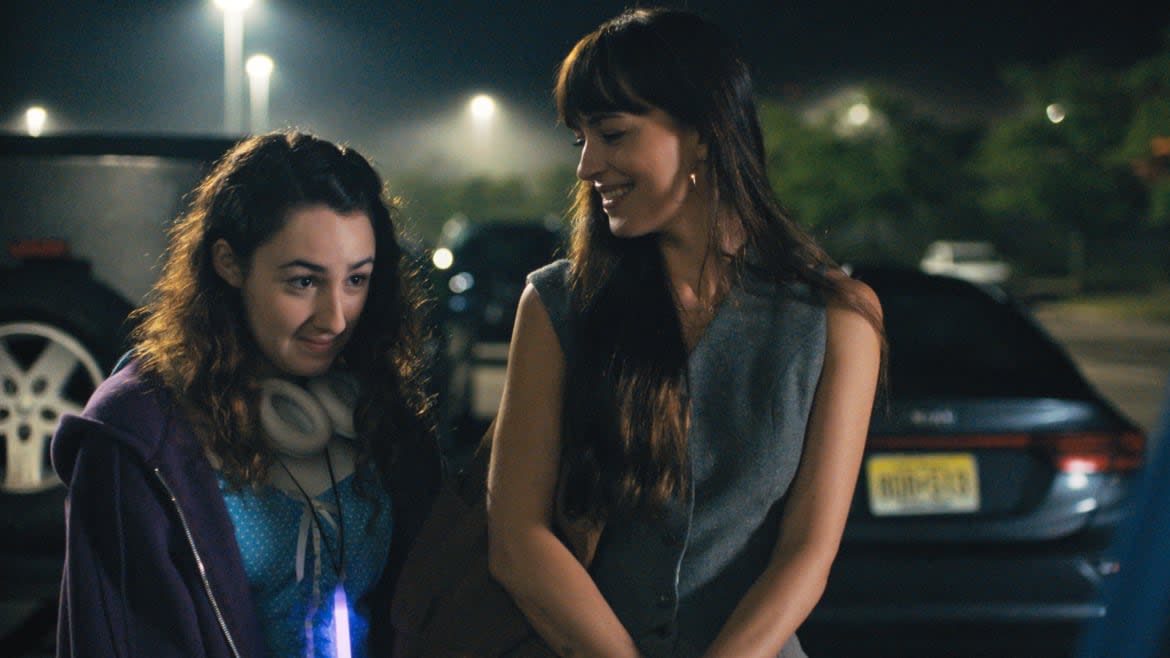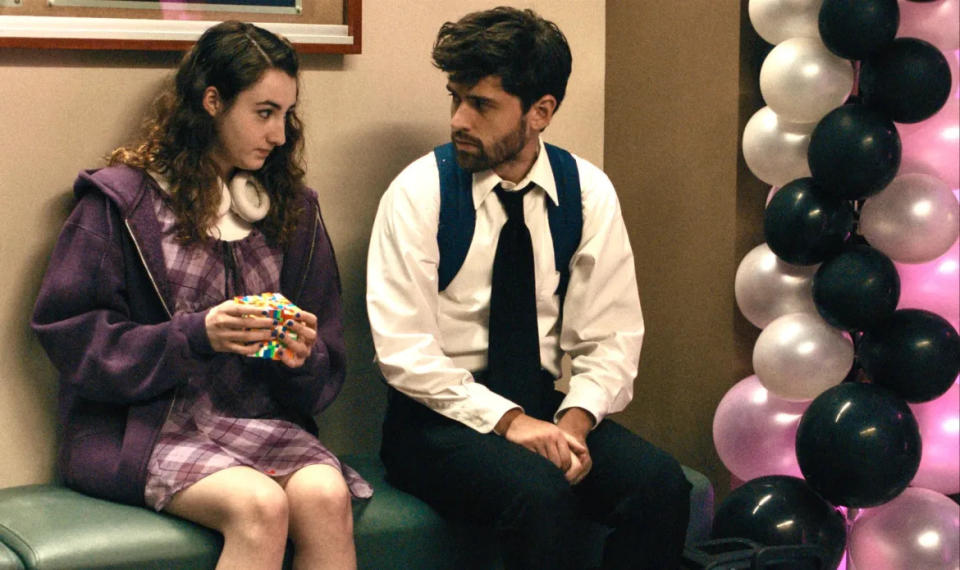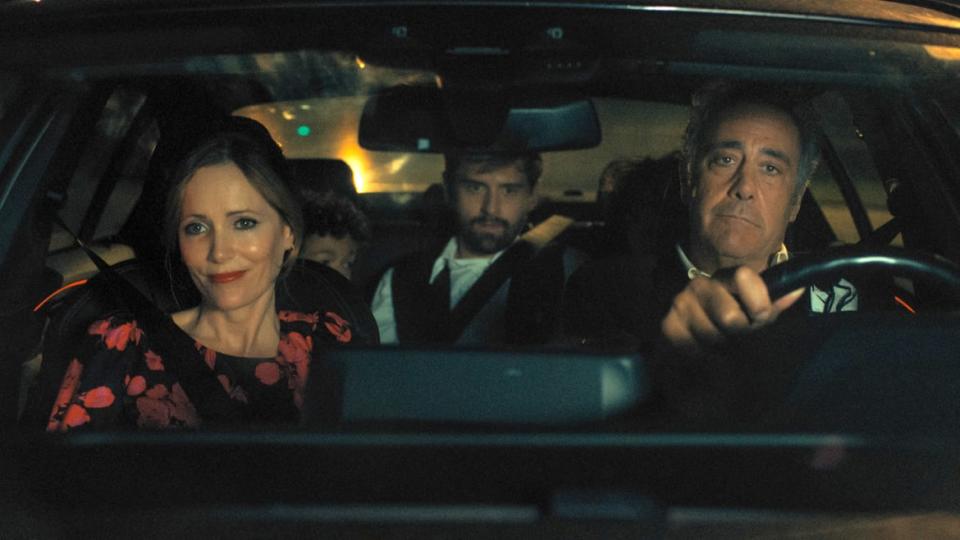Autistic People Deserve Better Than ‘Cha Cha Real Smooth’

Cha Cha Real Smooth is a selfish movie. Writer/producer/director/editor Cooper Raiff, who also stars in the film as protagonist Andrew, has a brief but noticeable history of making art all about himself, and the Apple TV+/Sundance darling is only the latest example.
In 2020, Raiff broke through at SXSW with his Grand Jury Prize-winning debut Shithouse, another film in which he controlled all aspects of production. That film’s lead character (whom he also played) attempted to find love at college with a generically perfect character that read like a self-gratifying insert for Raiff himself.
Cha Cha Real Smooth, his sophomore feature, is more of the same. The only meaningful difference is that Raiff’s character has now graduated college. He’s currently slumming it in the liminal space of entry-level food court jobs that aren’t helping him move out of his parents’ house.

The greatest problem with Lola (Vanessa Burghardt) is that Cha Cha Real Smooth never deigns to explore her inner life.
After being asked by his parents to accompany his younger brother to a bar mitzvah, Andrew takes notice of young mother Domino (Dakota Johnson) and her autistic teenage daughter Lola, played by Vanessa Burghardt, who accomplishes the all-too-rare feat of playing an autistic character while also being autistic in real life. Lola has been held back a couple grades, so she’s older than most of her mitzvah-aged school peers. Domino accompanies her daughter to these celebrations, in order to help her become more comfortable in social gatherings, although Lola is often more content to solve her giant Rubik's Cube in solitude. Andrew finds the duo intriguing, and he manages to strike up a friendship with Domino that blossoms into something even more intimate.
Cha Cha Real Smooth is burdened with several fundamental issues. Like Shithouse before it, every character serves to accentuate all of Andrew’s preening nice-guy sentiments, showing just how unwaveringly selfless and eager-to-please he is at all times. Andrew’s growth, which entails little more than learning to find fulfillment in his own company, is conditional upon the inconveniences and epiphanies of others. But those epiphanies are only written from Andrew's perspective, anyway.
The final product is a film that’s the cinematic equivalent of high-fructose corn syrup: enticing in its sickly sweetness but ultimately hollow. And that leaves its inclusion of an autistic character immediately fighting an uphill battle of believability.
Vanessa Burghardt belongs to an ever-expanding wave of actors who themselves are autistic playing autistic characters, preceded by the likes of Mickey Rowe in an Indiana production of The Curious Incident of the Dog in the Night-Time and Kayla Cromer in the Freeform sitcom Everything’s Gonna Be Okay. Unlike her older cast mates in Cha Cha Real Smooth, I sensed some real potential in Burghardt’s on-screen presence. Her eyes twinkle with an earnest sense of concentrated whimsy, and Lola’s sheepishly welcoming quality only accentuates her still-to-be-discovered charms. Her natural warmth felt very recognizable to me, being autistic myself, and could’ve well led to a striking performance—if the script had lent Burghardt any room to assert her agency.
‘Cha Cha Real Smooth’ Is a Total Cringefest
Unfortunately, however, Lola displays the film’s most egregious flaws in microcosm. One of the first things we learn about Lola is that she has been held back a couple of grades, leaving her much taller and older than the majority of her peers. Despite these implied difficulties with middle school-level curricula, everything about Lola’s personality would suggest that she’s actually ahead of her peers: She has an astonishing knack for pattern recognition, as is exhibited by her love of Rubik’s Cubes, and has a highly verbal command of her large vocabulary, which she displays in a game of Scrabble with Andrew.
These seemingly contradictory traits aren’t necessarily implausible. Autistic people often have highly concentrated areas of strengths and difficulties, and Lola’s impressive ability to retain the very literal minutiae of her interests may not translate to, say, comprehending the nuances of figurative language in the literature she studies at school.
But Burghardt’s line delivery also reads as quite stilted, reflecting a shallow understanding of Lola’s personality. Her vocal cadence never fosters a cohesive rhythm, as if obligated to forcefully signal that Lola is autistic by making her words as alienating as possible to a non-autistic audience; her enunciation is too staccato at its most casual, elongating the wrong words in her sentences to make her points heard. And in Lola’s few interactions involving haphazard eye contact, Burghardt speaks nearly every other word through a shifting, contorted mouth—a portrait of tics that distance her from her audience in quantity but never become cohesive in aggregate.
The greatest problem with Lola is that Cha Cha Real Smooth never deigns to explore her inner life. Raiff’s script establishes her as having struggled in school to such a disabling extent, framing Lola as just enough of a burden for him to pat his own character on the back for lovingly accommodating her without judgment. All the while, the film never has to engage with any genuine difficulty that might come with placing Lola in a stressful or overwhelming moment.
Instead, it settles for a surface-level admiration of her seemingly random litany of eccentricities. (For one thing, she has a potato masher collection that is never explained and has no deeper symbolic connection to her character.) It's as if Raiff Googled “autism” once and constructed Lola from there. He assembles a list of tics and mannerisms recognizable to broader audiences as being autistic without having to imbue Lola with actual depth to maintain the film’s treacly sentimentality.
Raiff wasn’t the sole author of Lola’s character, though—Burghardt herself actually acted as a consultant to Raiff in the writing of Lola, offering insight as to how an autistic person might react in certain situations. This sense of curiosity is conveyed during a couple of key scenes in the film, one of which features Andrew asking Lola whether or not extended periods of conversation drain her, after noticing that she seems to have become tired of repeatedly playing board games with him while he babysits her. Lola responds honestly: While she does genuinely appreciate Andrew’s willingness to get to know her on a deeper level, she often prefers her own company, finding interpersonal conversation to at times require more energy than it’s worth.
Though Raiff’s attempt at writing this scene is respectable, the exchange once again reveals the deeply ingrained flaws at the heart of the film. The conversation offers a very blunt, rote explanation for Lola’s character traits, rather than allowing her to demonstrate her conversational preferences over time.
While its impact is sweet in the moment, once that revelation of Lola’s social boundaries is placed in the broader context of the film, it completely undermines the premise by which Andrew met Domino and Lola in the first place. If Lola is so depleted by a conversation as low-key as the one during which this confession takes place, it stands to reason that she would be rapidly exhausted by the noisy, chaotic environment of a bar mitzvah, to which her mother repeatedly subjects her in order to acquiesce to social norms that she sees no real need to meet. Ultimately, Lola’s humanity depends on her conforming to the expectations of an audience that is not themselves autistic. There is no space here for honoring Lola’s own needs.

In Cha Cha Real Smooth, the priority is always on Andrew’s (Cooper Raiff) character development, not that of anyone else.
Compare Cha Cha Real Smooth with the aforementioned Everything’s Gonna Be Okay, in which Kayla Cromer portrays the teenage Matilda, who is taken into her half-brother’s guardianship after her father dies. From the show’s pilot episode, Matilda appears to be a passionate, emotional young woman. She’s tenacious about pursuing her gifts while often frustrated by the judgment she faces in having to constantly reassess her own feelings, in order to assert a “presentable” form of independence. The show is by no means perfect—the first season ends with an episode during which a childhood meltdown of Matilda’s is used as a punchline in a stand-up set—but it takes Matilda’s frustrations seriously and examines the pathos in her journey to find agency that still makes space for her authentic self-expression.
While the creator of a fictional narrative that features an autistic character being autistic themselves is not a prerequisite for good storytelling, it is worth noting that Josh Thomas, creator and star of Everything’s Gonna Be Okay, revealed in the conjunction with the show’s season two premiere that he had discovered that he is autistic as well. It’s a degree of foresight that explains why taking into account Matilda’s experiences came naturally to him.
The broader inclusion of autistic actors within the film and television industries is a net positive for the future of entertainment. Autistic talent is present everywhere, and allowing autistic actors to imbue their characters with our unique sense of joie de vivre makes these portrayals that much more compelling in representing the full bandwidth of our emotionality. However, even Vanessa Burghardt's promising young voice can’t rectify the film’s failure to create an autistic character whose needs are understood and accommodated.
I can only hope that Burghardt will be able to move beyond roles that pigeonhole her into a regressive typecast. But before that happens, Hollywood will have to learn that autistic talent can’t compensate for stories that remain fundamentally unchallenging.
Get the Daily Beast's biggest scoops and scandals delivered right to your inbox. Sign up now.
Stay informed and gain unlimited access to the Daily Beast's unmatched reporting. Subscribe now.

 Yahoo Movies
Yahoo Movies 
